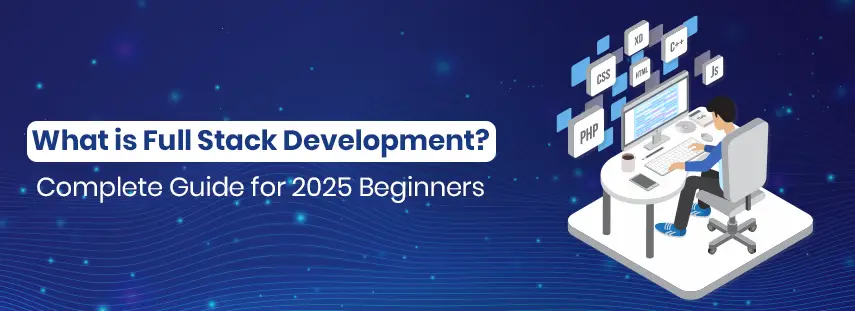Join As Students, Leave As Professionals.
Develearn is the best institute in Mumbai, a perfect place to upgrade your skills and get yourself to the next level. Enroll now, grow with us and get hired.

How To Become a Full-Stack Java Developer in 5 Steps
Learn the 5 key steps to becoming a full-stack Java developer. Find out which skills, tools, and training programs like Develearn’s Full Stack Developer Course in Mumbai will help you succeed.
DeveLearn Technologies
30 minutes
October 14, 2024

If you're interested in building web applications and working on both front-end and back-end tasks, becoming a full-stack Java developer might be the right career for you. Understanding the steps involved in this role can help you decide if it suits your goals and interests. It can also guide you in identifying the skills you'll need to succeed.
In this blog, we'll define what a full-stack Java developer is, outline the steps to become one, and go over key skills developers often have.
What is a Full-Stack Java Developer?
A full-stack Java developer is a programmer who specializes in using Java, a widely-used programming language. These developers are skilled in writing code for all three parts of a web application: the front-end, back-end, and database layers.
Front-end development focuses on creating the parts of the application that users see and interact with.
Back-end development handles the data and processes that run behind the scenes to support what users see.
The database layer is responsible for storing and retrieving data for the application to function properly.
Full-stack developers are versatile, as they can work on both the user-facing aspects and the behind-the-scenes functions of a web application.
What Does a Full-Stack Java Developer Do?
Full-stack Java developers are involved in both creating and improving web-based applications. They often take on leadership roles in web development teams, helping design new websites or update existing ones.
In a company: Full-stack Java developers may lead a team to build or improve web applications, ensuring everything runs smoothly from front to back.
As consultants: They may offer their expertise to different businesses, providing advice or completing tasks based on their programming skills.
Their work can involve coding, troubleshooting, and ensuring the web applications meet user and business needs.
How to Become a Full-Stack Java Developer
Follow these steps to start your journey as a full-stack Java developer:
1. Learn the Basics of Java
Java is a powerful programming language, and it can take some time to become confident in using it. Start by taking beginner-level courses, using templates to create simple programs, and watching tutorials. Instead of focusing on just one aspect of coding, try to build a strong foundation in all areas of Java. This will help you understand the front-end, back-end, and database layers, which are essential for full-stack development.
2. Enroll in a Computer Science Program
While degree programs are one option, specialized courses can also help you gain the skills needed to become a full-stack Java developer. If you're looking for comprehensive, hands-on training, consider enrolling in Develearn’s Full Stack Developer course in Mumbai. This program focuses on the essential technologies and tools required for both front-end and back-end development, helping you fast-track your learning journey.
Develearn offers:
Training from top industry professionals
Real-world projects to apply your skills
Courses on Java, Python, JavaScript, and other crucial technologies
Placement Assistance
Enroll in Full Stack Developer Course in Mumbai to kickstart your career in web development.
3. Seek an Apprenticeship
Many aspiring developers choose to pursue an apprenticeship to complement their education or gain extra hands-on experience. Working closely with an expert-level coder allows you to learn advanced coding techniques and get real-world training. During an apprenticeship, a mentor can guide you by reviewing your code, introducing you to new tools, and teaching you about important software systems. This practical experience can significantly enhance your skills and prepare you for a successful career in full-stack development.
4. Gain Relevant Experience
Once you've learned how to create Java-based applications, it's important to gain practical experience through internships or entry-level jobs. These roles allow you to work on real projects, often as part of a team, which helps you refine your coding skills and collaborate in a professional setting. Starting with front-end or back-end development positions can help you build a strong foundation before transitioning into full-stack development.
If you’re looking to boost your qualifications, consider enrolling in the best full-stack developer course in Mumbai offered by Develearn, one of the best institutes for full-stack developers in Mumbai. Our full stack course in Mumbai covers everything you need, from building a solid foundation in Java to gaining hands-on experience with projects, preparing you to excel in your future career.
To advance your career, join the full-stack web development course in Mumbai and gain the experience needed to apply for top full-stack developer roles. This will significantly improve your chances of standing out to employers.
5. Update Your Resume
To stand out to potential employers, it’s important to highlight your full-stack development skills in your resume. Focus on listing the programming languages you’ve mastered, especially Java, and your experience in both front-end and back-end development. Demonstrate your ability to work in a team by including examples from past projects where you collaborated with others to achieve successful outcomes.
If you've completed a full stack web development course, make sure to mention it in your education section. A certification from the best full stack developer course in Mumbai can help you gain the attention of hiring managers, especially if it's from a well-regarded institute like Develearn, known as one of the best institutes for full stack developers in Mumbai.
Skills You Need to Become a Full-Stack Java Developer
To excel as a full-stack Java developer, acquiring the following skills can greatly increase your chances of success:
Front-End Design Ability
A key skill for full-stack Java developers is a strong understanding of front-end design. This involves blending creative design elements with functional coding techniques to create an engaging user experience. Your ability to design user-friendly and visually appealing interfaces using front-end frameworks like React and Angular is essential. Highlighting these skills on your resume can set you apart from other candidates during the job application process.
For those based in Mumbai, enrolling in a specialized course, such as Develearn's Full Stack Course in Mumbai, can help you gain practical experience with front-end technologies.
Testing Ability
Full-stack Java developers are often responsible for creating unit and integration tests as part of their development process. A unit test involves testing small sections of code to ensure they work correctly on their own, while an integration test checks how these code units function together as part of a larger system. Employers look for candidates who can effectively design and implement these tests, ensuring that the application runs smoothly.
Familiarity with unit testing frameworks like JUnit or Mockito is highly valuable, as these tools help developers efficiently test their code. Demonstrating your ability to use such frameworks can enhance your profile and make you stand out to potential employers.
Ability to Integrate Microservices
Many Java-based web applications use service-oriented architecture, which allows developers to integrate microservices. Microservices are small, independent components that work together to deliver specific functionalities within an application. Employers often look for candidates who have a solid understanding of microservices and know how to implement them effectively.
Learning the Spring Framework can be especially useful, as it is commonly used in microservice development. By gaining expertise in Spring, you can demonstrate your ability to design and integrate microservices, making you a more attractive candidate for full-stack Java developer roles.
Ability to Use Tools
Tools play a vital role in full-stack development, enabling developers to collaborate, test, and debug their code more efficiently. These tools help boost productivity and allow developers to work across various web technologies.
DevOps tools like Docker, Ansible, and AWS are widely used in full-stack development, helping developers plan, test, and monitor their code effectively. For those who have completed a full stack web development course in Mumbai, mastering such tools is essential to building applications quickly and efficiently. Integrated development environments (IDEs) like Eclipse, NetBeans, and IntelliJ IDEA help combine the three layers of a web application into one environment, simplifying the development process.
By acquiring these skills through Develearn, the best institute for full stack developer in mumbai, you’ll be well-prepared to handle complex projects, which can give you an edge in the job market.
Ability to Use APIs and Libraries
Application programming interfaces (APIs) allow developers to integrate existing pieces of code into their applications, making development faster and more efficient. These reusable code snippets often come from libraries that other developers have created and shared online.
Full-stack Java developers typically have a strong understanding of these libraries and know how to create and implement APIs within their code. Mastering the use of APIs and libraries can greatly enhance your ability to build scalable, high-performance applications.
For those who have completed a full stack course in Mumbai, understanding how to work with APIs and libraries is crucial, as these skills are highly valued in the industry.
Ability to Work Well in Teams
In addition to technical skills, full-stack Java developers are often required to work in collaborative teams to complete large-scale projects. Being able to lead, follow directions, and recognize the strengths of your team members can help you meet project goals and deliver high-quality web applications.
Demonstrating your ability to work well in a team is essential. You can highlight this skill on your resume and in interviews by sharing examples of past experiences where you successfully collaborated on projects. This not only shows your teamwork abilities but also reflects your versatility in handling complex tasks with others.
Conclusion
Becoming a full-stack Java developer is a rewarding journey that combines technical expertise with the ability to collaborate effectively in teams. By mastering essential skills like front-end design, microservice integration, testing, and the use of APIs, along with gaining hands-on experience through internships or specialized courses, you can position yourself for success in the industry.
If you're looking to fast-track your development career, consider enrolling in a comprehensive program like Develearn’s Full Stack Developer Course in Mumbai. With the right training and experience, you'll be well-prepared to take on the challenges of full-stack development and thrive in your career.




